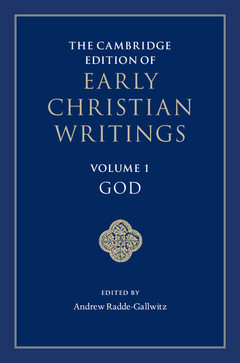Description
The Cambridge Edition of Early Christian Writings: Volume 1, God
The Cambridge Edition of Early Christian Writings Series
Coordinator: Radde-Gallwitz Andrew
This book is the first volume in the definitive anthology of early Christian texts, focusing on faith.
Language: English
Subject for The Cambridge Edition of Early Christian Writings...:
Publication date: 11-2017
402 p. · 15.7x23.5 cm · Hardback
402 p. · 15.7x23.5 cm · Hardback
Description
/li>Contents
/li>Biography
/li>
The Cambridge Edition of Early Christian Writings provides the definitive anthology of early Christian texts, from c.100 to 650 CE. Its six volumes reflect the cultural, intellectual and linguistic diversity of early Christianity and are organized thematically on the topics of God, practice, Christ, community, reading and creation. The series expands the pool of source material to include not only Greek and Latin writings, but also Syriac and Coptic texts. Additionally, the series rejects a theologically normative view by juxtaposing texts that were important in antiquity but later deemed 'heretical', with orthodox texts. The translations are accompanied by introductions, notes, suggestions for further reading and scriptural indices. The first volume focuses on early Christian writings about God's nature and unity, and the meaning of faith. It will be an invaluable resource for students and academic researchers in early Christian studies, history of Christianity, theology, religious studies and late antique Roman history.
Notes on contributors; Acknowledgments; Note on the texts and translations; Series introduction; Introduction; Part I. The Emergence of Christian Theology (150–300): 1. Ptolemy, Letter to Flora translated by Bradley K. Storin; 2. The Gospel of Truth translated by Ellen Muehlberger; 3. Irenaeus of Lyons, Against Heresies 1.21.1-2, 2.28.1-9 and 4.20.1-8 translated by Anthony Briggman; 4. Tertullian, Against Marcion 1.2-5 and 1.22-27 translated by Mark DelCogliano; 5. Hippolytus, Against Noetus 1-11 and 14-17 translated by Andrew Radde-Gallwitz; 6. Origen of Alexandria, On First Principles, Preface and 1.1-3 translated by Bradley K. Storin; Part II. Creeds and Controversies (300–400): 7. Arius, Letters to Eusebius of Nicomedia and Alexander of Alexandria translated by Mark DelCogliano; 8. Creed of the Council of Nicaea (325) translated by Mark DelCogliano; 9. Eusebius of Caesarea, On Ecclesiastical Theology 2.1-7 translated by Mark DelCogliano; 10. Hilary of Poitiers, On the Trinity 8.19-26 and 41 translated by Mark DelCogliano; 11. Basil of Ancyra, The Synodal Letter of the Council of Ancyra translated by Jeffrey Steenson; 12. Athanasius of Alexandria, On the Synods at Ariminum and Seleucia translated by Andrew Radde-Gallwitz; 13. Ephrem, Hymns on the Faith 40, 73-75 translated by Ellen Muehlberger; 14. Ephrem, Commentary on the Gospel 1.2-8 translated by Matthew Crawford; 15. Basil of Caesarea, Letters 159 and 236.6 translated by Mark DelCogliano; 16. Ambrose of Milan, On the Faith 1 translated by Mark DelCogliano; 17. Creed of the Council of Constantinople (381) translated by Mark DelCogliano; 18. Gregory of Nyssa, On the Holy Spirit against the Macedonian Spirit-Fighters translated by Andrew Radde-Gallwitz; 19. Gregory of Nazianzus, Poems 1.1.1-3 translated by Bradley K. Storin; 20. Eunomius of Cyzicus, The Confession of Faith translated by Mark DelCogliano; Part III. Doctrinal Inheritance and Philosophical Exploration (400–c.570): 21. Augustine of Hippo, Sermon 52 translated by Mark DelCogliano; 22. Cyril of Alexandria, Five Tomes against Nestorius 4.1-2 Translated by Matthew Crawford; 23. Pseudo-Dionysius, On the Mystical Theology to Timothy translated by Andrew Radde-Gallwitz; 24. Boethius, On the Holy Trinity Translated by Andrew Radde-Gallwitz; 25. John Philoponus, Fragments on the Trinity translated by Andrew Radde-Gallwitz; Suggestions for further reading; Scriptural index.
Andrew Radde-Gallwitz has written widely on the early Christian doctrine of God. His first monograph, Basil of Caesarea, Gregory of Nyssa, and the Transformation of Divine Simplicity (2009), won a Templeton Award of Theological Promise. He has published book-collaborative translations of works by Athanasius of Alexandria, Didymus the Blind and Basil of Caesarea. He is currently working on a monograph on Gregory of Nyssa's doctrinal writings and a study of the various uses of creeds in early Christianity. He is Assistant Professor in the Program of Liberal Studies at the University of Notre Dame, Indiana, where he teaches courses on the Great Books and the history of Christian theology.
© 2024 LAVOISIER S.A.S.




